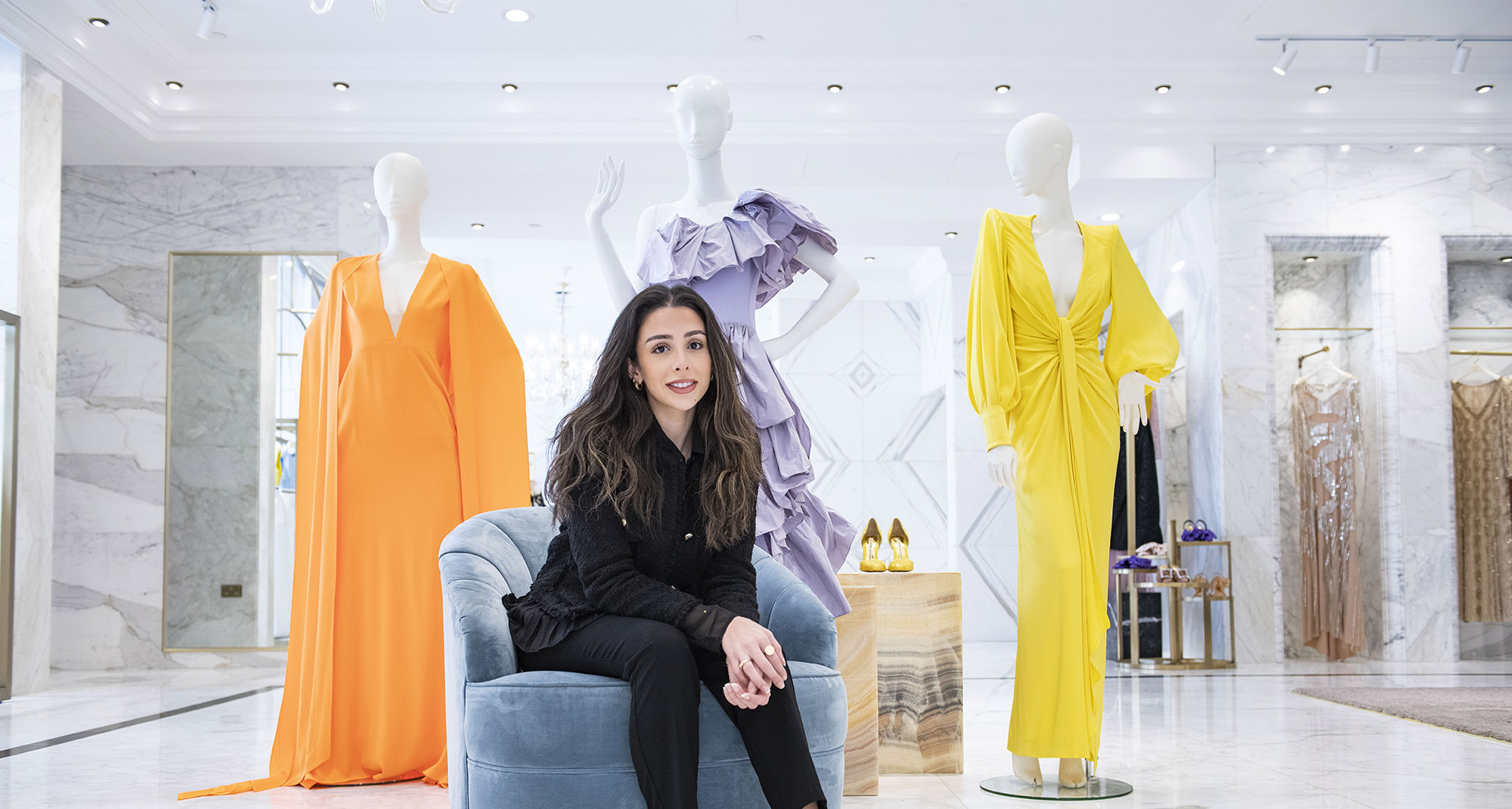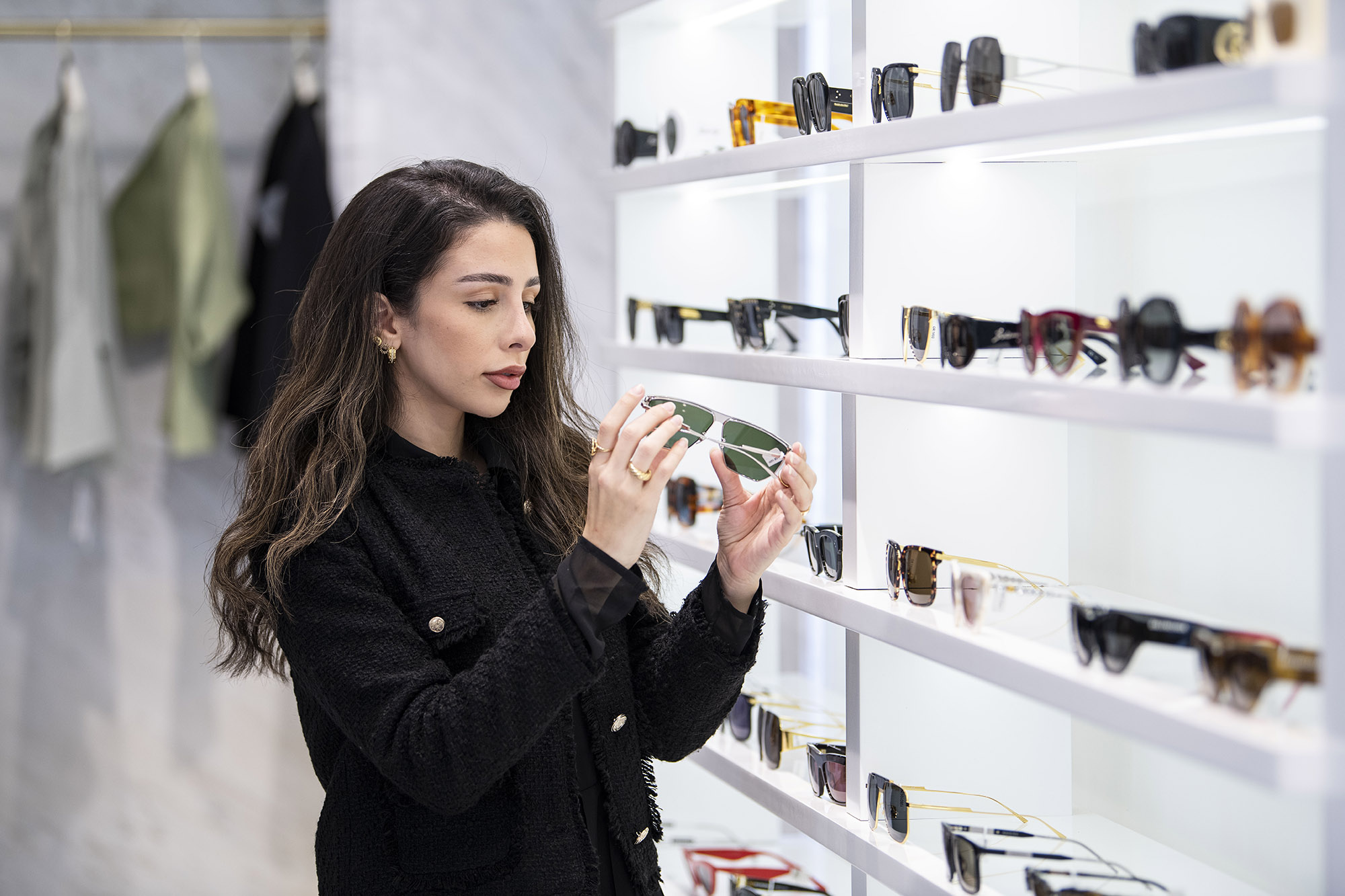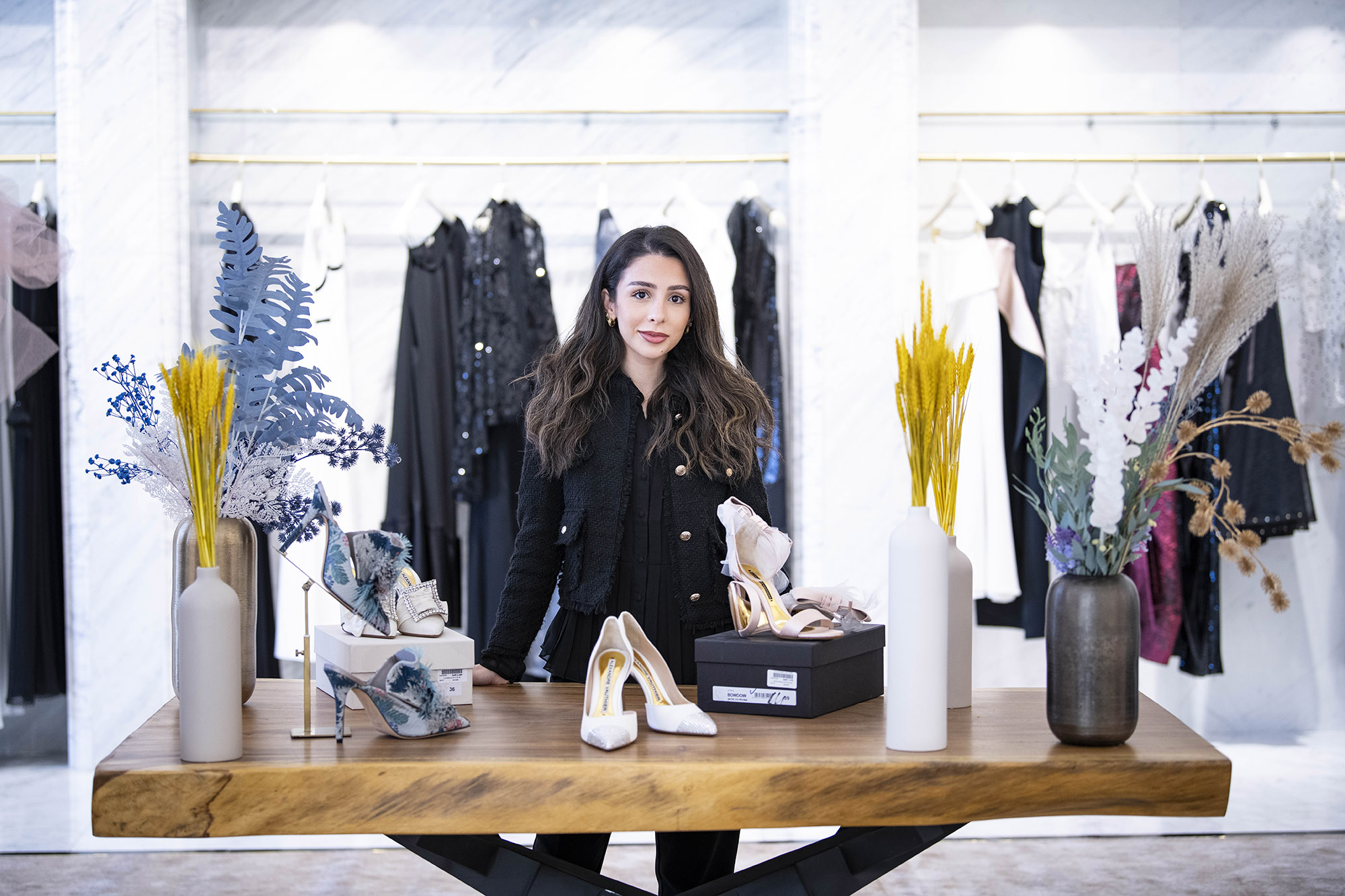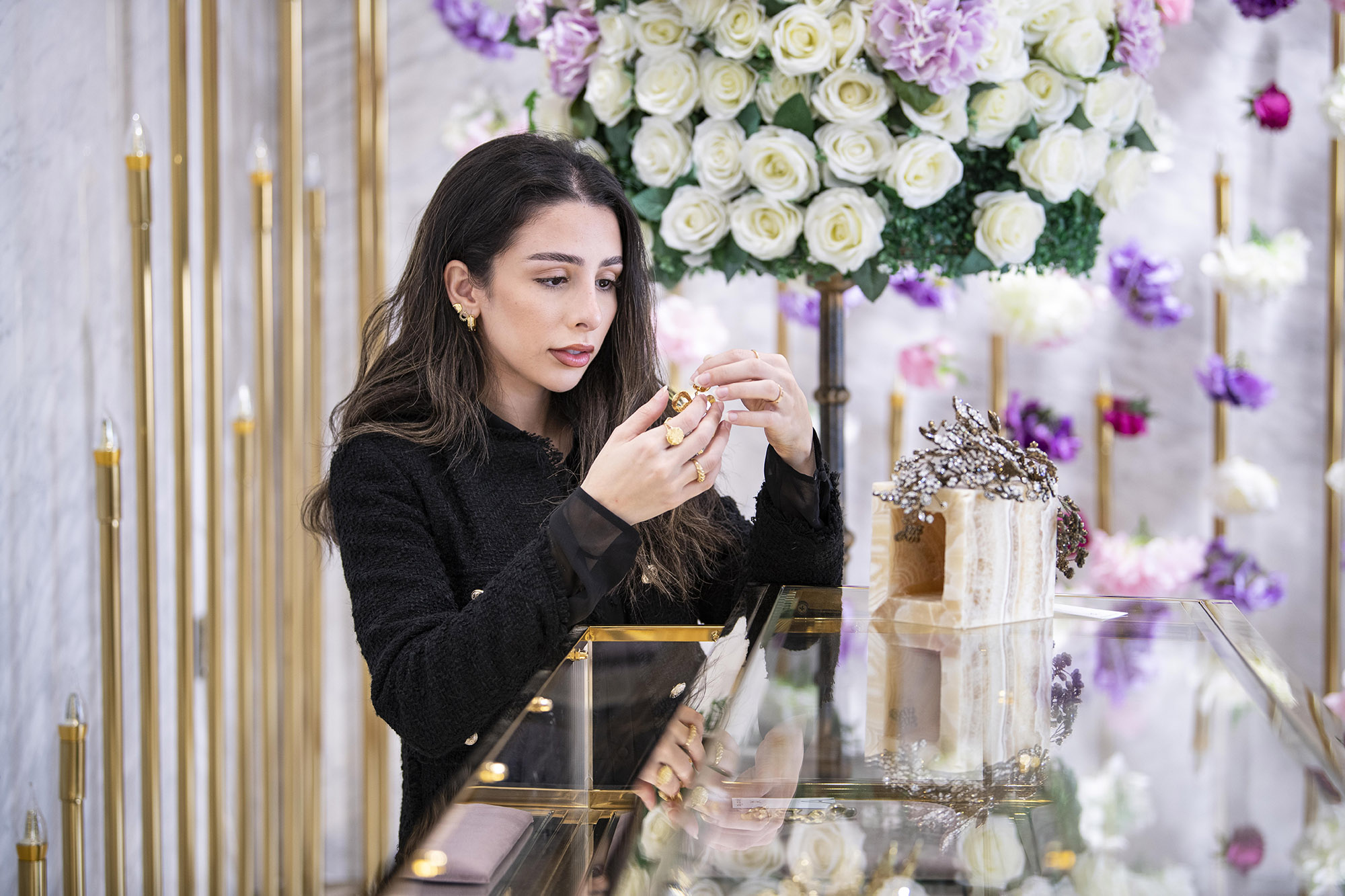- Academics
- Admissions
- Enrollment & Registration
- Research
- Academic & Creative Spaces
- Strategic Partnerships
- Our Impact
- Student Affairs
- Alumni
- About VCUarts Qatar
- Community & Continuing Education
OUR INTERNATIONAL ART AND DESIGN BIENNIAL, TASMEEM DOHA, IS BACK!
Research-Based Strategy Key to Business Sustainability of High-End Brands, says VCUarts Qatar Alumna
February 15, 2021
Categories

Fashion Design graduate and luxury retail buyer Yasmeen Tubailah shares insights into how luxury brands balance fine taste with value for money and salability
The job requirements are clear: you will be responsible for the retail procurement of more than 200 luxury labels; you will have the adaptability to thrive on challenges; and, you will help the organization you’re working for – one that earned a place on New York Times’ 2016 list of the World’s Coolest and Most Cultured Malls – strike the right balance between luxury and fine taste on one hand, and business sustainability and digitization on the other.
Readers can attempt to visualize the drive, dedication and attention to detail that such a role demands. Or, better still, they can meet Yasmeen Tubailah, Retail Buyer and Department Manager at Al Hazm Mall, Qatar’s only luxury mall.

“Sound research-based strategy is key to the sustainability and salability of high-end brands,” says the VCUarts Qatar Class of 2018 graduate, who currently oversees six stores at the luxury mall that handles diverse retail segments including haute couture, fine jewelry, ready-to-wear, kids wear, luxury footwear, leather goods, accessories and more.
“Contrary to public belief, luxury designers, vendors and consumers are cautious of where and how they spend money. This means retail managers need to know their target audience; their budgets, their tastes, and their preferred brands to ensure that products are procured from outlets that offer value for money. That in turn, helps avoid surplus stocks and losses, keeping the business sustainable.
“Additionally, the sense of immediacy and accessibility of the digital world has resulted in customers who are well-informed of trends. This means that luxury brands can no longer rely only on their location in an upmarket neighborhood, or a certain niche clientele, to maintain their brand value or promote a product. Hence, a digital presence has become paramount to a brand’s sustainability.”
As she shares her business insight, Tubailah says that she became aware of just how complex the fashion industry is only when she was in her first year at the Qatar Foundation partner university; prior to her studies there, she, “much like most of the public, assumed that fashion design was confined to designing clothes and accessories”.

“I never dreamt that a degree in fashion design would eventually lead me to my current position as Retail Buyer at Al Hazm Mall,” she says. “I was surprised to learn that there was so much more to the course than mannequins, measuring tapes, and materials; that it’s all about research, research and more research. And when you look at the global fashion industry, it makes sense; the entire sector is built around the ability to analyze and anticipate. It was a steep learning curve, but VCUarts Qatar immersed me into it.”
The Jordanian – who, is also a graduate of Qatar Academy Doha – says that there isn’t a day when she does not apply what she learnt in university, in her job.
“My faculty introduced me to the essentials of fashion business including ideation, pitching, product development, target audience, brand positioning, logo design, return on investment, and market research,” says the Fashion Design alumna. “I understood the need to create designs based on cultural preferences, purpose, age, gender, seasons, weather, availability of materials, and of course, budget.
“Today, when I use specialized programs to help me forecast fashion trends, I often recall my undergrad classes where Sonali Raman, a faculty member, introduced me to the same.”
Tubailah’s job requires her to travel abroad, mostly to Europe, to hand-pick clothes and accessories directly from the designers. It is a cycle that involves weeks of studying, analyzing trends and markets, and preparing convincing discussion points to present to the stakeholders she works with, all in the hope that the price, quality, finish, and style of the ordered consignments appeal to her customers in Qatar.
“Fashion trends in this region follow the European market, albeit with slight modifications,” she notes. “Typically, there is a six-month lag between a trend appearing in Europe, and Qatar, with the Fall and Spring collection dominating the industry. This means a retailer needs to be nimble to pick up what’s in vogue, have the skills to explain to the designers exactly what modifications need to be done to suit his or her clientele, and have it delivered within a time frame that allows for targeted marketing in Qatar.
“Like any profession, practice makes perfect; seasoned retailers acquire enough experience to work ahead and debut a trend in Qatar at the same time that it hits the market in Europe.”
Tubailah explains how, like all products, reordering is based on demand. But unlike fast moving consumer goods that are in store for a year or more, allowing sellers the luxury of periodically promoting products, the six-month fashion cycle leaves very little room for marketing.

“With the emphasis on quality over quantity, and given the time and money spent in procuring luxury labels, a certain threshold of sales should be reached before further orders can be placed,” Tubailah explains. “On a parallel track, it is essential to monitor a brand’s performance and support it with an additional marketing push as and when necessary. This way a brand can remain sustainable.”
Prior to joining Al Hazm Mall, and soon after graduating from VCUarts Qatar, she developed her own label under her name ‘Yasmeen Tubailah’, offering ready-to-wear clothes. It was a venture she thoroughly enjoyed, as it “was an outward expression for someone who was keen to create designs that were unique, and reflected the persona of the wearer.”
Her current role required her to temporarily shift her focus, yet she says she still managed to start two ventures – named ‘Casi’ and ‘Shades’ – at Al Hazm Mall, with ‘Casi’ offering luxury leather goods and mobile accessories, and ‘Shades’ selling luxury eyewear brands such as Gucci, Dolce & Gabbana, and more.
The 25-year-old admits that while being a retail buyer and manager at a luxury mall requires her to be on her toes 24/7, the amount of knowledge she’s gained over the last few years compensates for the effort she puts in.
“In the first few weeks on the job, one of the first things I learned was that the representation and display of a fashion brand in a multi-brand store are very important,” she says. “For instance, factors such as the proximity of one brand to another, and the specific angle of display which in turn links to a brand’s identity, are explicit brand requirements that need to be adhered to.”
“When I was first told about that, I remember thinking: ‘Gosh! I’ll be learning something new not every day, but every few hours!’. And it’s that pull that makes me want to come to work each day. For me, learning is a magnet.”
Photographs by Raviv Cohen.

